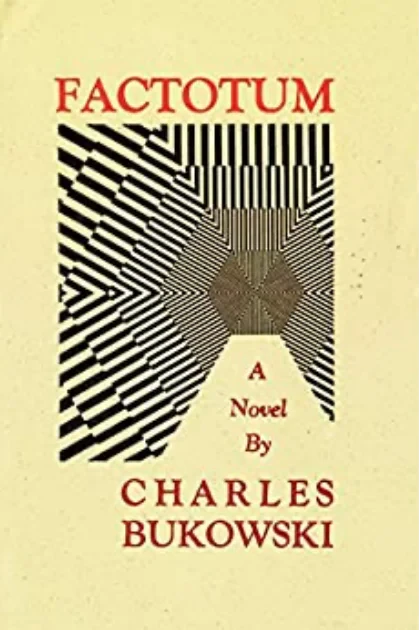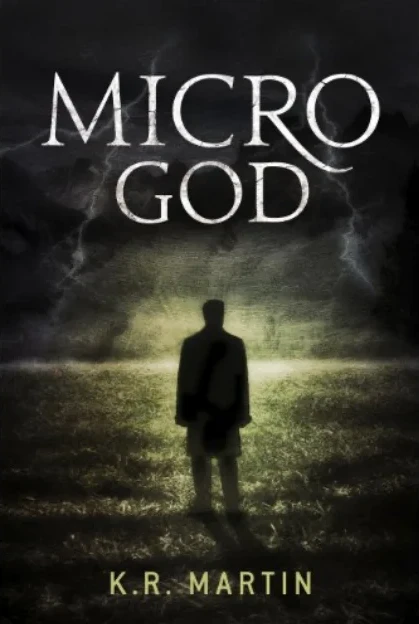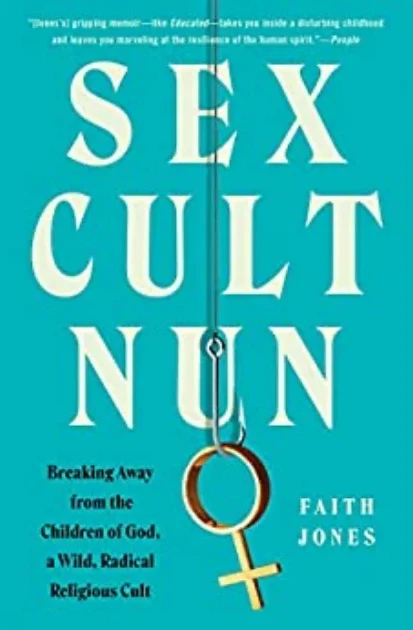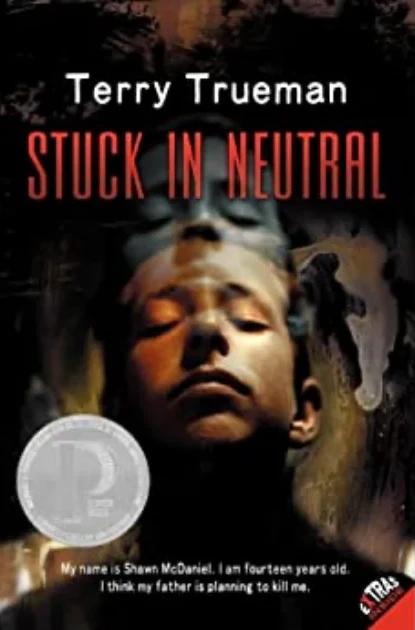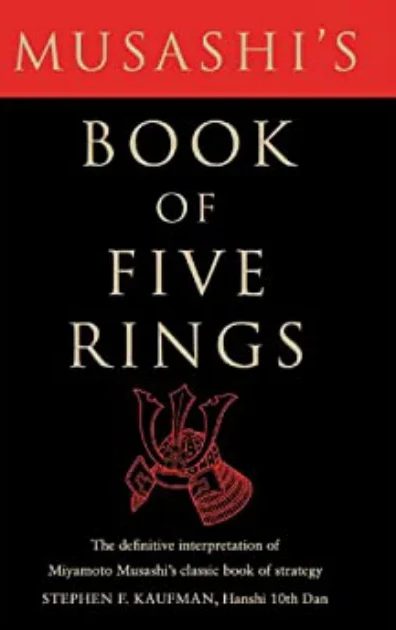Factotum (Fair Use)
My editor friend says Charles Bukowski is an easy target for haters, and I agree after reading some of the approximate 70,000 Goodreads’ comments and reviews characterizing Factotum as “smut,” “misogynistic,” or “the writing of a nasty drunk.” I cannot deny these descriptors, but even positive reviews often erroneously depict Bukowski as a rebel or nonconformist hero who relentlessly pursues booze and sex while rejecting work. Factotum’s winding path through drinking, sex, and jobs, ladened with easy judgments, snares many critics in the literary merit debate.
The struggle for Factotum’s meaningfulness begins with the author. Bukowski's end and Henry Chinaski's beginning become indistinguishable to many readers. (A confusion illustrated by my unintended use of “Bukowski” in place of the protagonist's name “Henry Chinaski”). Bukowski’s life bleeds into his fiction, explaining the difficulty separating writer from character, yet he did create the character, perhaps to denote the fictional nature of the portrayed life or to obfuscate reality, maybe both. Whatever the reasoning, the readers confound when seeking meaning, epitomizing Bukowski as the unreliable narrator whose authenticity we constantly question. This trait readily appears in Factotum’s flat dialogue that begs not to be believed while simultaneously entertaining,
“I’m a writer temporarily down on my inspiration.”
“Oh, a writer, eh?”
“Yes.”
“Are you sure?”
“No, I’m not.”
"What do you write?"
"Short stories mostly. And I’m halfway through a novel."
"A novel, eh?"
"Yes."
"What’s the name of it?"
“The Leaky Faucet of My Doom.”
“Oh, I like that. What’s it about?”
“Everything.”
“Everything? You mean, for instance, it’s about cancer?”
“Yes.”
“How about my wife?”
“She’s in there too.”
This often-quoted passage from Factotum is a staple of Bukowski’s unnatural dialogue style and humor that gives every character the same voice, easily evidenced by many discussions in the book,
I paid for three of four more rounds. We didn’t speak. Then I told the lady, “That drink was it. I’m broke.”
“Are you serious?”
“Yes.”
“Do you have a place to stay?”
“An apartment, two or three days left on the rent.”
“And you don’t have any money? Or anything to drink?”
“No.”
“Come with me.”
Other times, Bukowski's honesty hurts to read, like when he lands an easy job,
Sundays were the best because I was alone and soon I began to take a pint of whiskey to work with me. One Sunday after a hard night’s drinking the bottle got to me; I blacked-out. I vaguely remembered some unusual activity that evening after I went home but it was unclear. I told Jan about it the next morning before I went to work. “I think I fucked up. But maybe it’s my imagination.”
It is not his imagination, and Bukowski goes to work, discovers he trapped the boss in the bathroom while in the throes of a drunken blackout, then tries to obtain a last free lunch from the company cafeteria, hoping no one knows of his termination. Moments of pathetic behavior, embarrassment, and other indiscretions provide Bukowski with a harsh realness, like watching a car accident unfold. More importantly, the unreliable narrator promises meaning beyond this seemingly well-crafted style that jerks readers between the truth and lies.
To the conservative members of society, Bukowski is the incompetent, lazy employee everyone hates. Christians loathe him, representing everything wrong in their worldview. Even more offensive to the moral majority is the honor he finds in these titles, wearing them like an Olympian with a gold medal. They see the true Bukowski, who not only hates the Establishment and all manifestations of work, career, and expectations but has taken up arms (or bottle) against the American dream. To the moral majority, he is the great enemy and holds no literary merit.
It was true that I didn’t have much ambition, but there ought to be a place for people without ambition, I mean a better place than the one usually reserved. How in the hell could a man enjoy being awakened at 8:30 a.m. by an alarm clock, leap out of bed, dress, force-feed, shit, piss, brush teeth and hair, and fight traffic to get to a place where essentially you made lots of money for somebody else and were asked to be grateful for the opportunity to do so?
To the liberal, the unreliable narrator’s revulsion to work clarifies Bukowski as the thing you can’t or won’t be, either hindered by fear or morality. They assign him the title of Hedonist Hero, who makes no apology for indulging pleasure. Some critical thinkers probe Bukowski, seeking social commentary within the character flaws and flat dialogue. Many dub him a realist, relating with the occasional hangover, the desire to call in sick, and silently suffering the boss or coworker, condemning them to hell’s gates. Some symbolize him as the warrior slashing at capitalism, conformity, and classism in their lack of courage to act any way other than what society deems responsible. There must be meaning, for he has presented the horror of poverty and labor's trap, albeit in a stupor working the assembly line of a dog biscuit factory,
On such jobs men become tired. They experience a weariness beyond fatigue. They say mad, brilliant things. Out of my head, I cussed and talked and cracked jokes and sang. Hell boils with laughter. …I came in drunk each night. It didn’t matter; I had the job nobody wanted. After an hour at the oven I was sober. My hands were blistered and burned. Each day I sat aching in my room pricking my blisters with pins I first sterilized with matches.
To most readers, Bukowski is an enigma, a struggle to balance his crudeness with empathy. Torn with uncertainty about the book and man, readers struggle to discover what meaning resides in Factotum, but like the biscuit factory Hell boiling with laughter, literature’s frustration cackles.
The unreliable narrator points his laughing, drunk finger at those hating the self-indulgent, evil man. He laughs at the venerators claiming him some form of hero or rebel, defending freedom or some other concept. He roars heartily, watching the many confused readers quibble over him. He laughs and laughs, having given so many hints,
I always started a job with the feeling that I'd soon quit or be fired, and this gave me a relaxed manner that was mistaken for intelligence or some secret power.
Fellow author Terry Trueman more than once told me, “There is no artifice with Bukowski.” I agree with Trueman; Bukowski is exactly as he describes himself, and though trite sounding, looking for meaning loses the meaning of the writing. Clearly, the point of Factotum speaks from the title, meaning “general servant,” an offensive hallmark of a society Bukowski deems worthless, but the unreliable narrator forces the reader to dig beyond this simple truth for not wanting to accept the face value of the drunkard wandering from job to job. Seeking meaning loses one in lies, half-truths, and pure honesty. For certain, Bukowski embellishes his part in the story, portraying himself as a drunk rebel or nonconformist fighting a holy war against the Establishment, and calling him a drunk or lowlife commits the sin of reducing Bukowski to a mere character flaw. Bukowski has invented himself as a lone wolf gnawing away his leg to be free of life’s trap, who inadvertently adorns the hero’s robe as he speaks his “truths” meant for him alone,
When you drank the world was still out there, but for the moment it didn't have you by the throat.
Unaware of his heroics, he becomes the most tragic hero because the society he condemns in his bottled wisdom also dooms readers (us) for being part of that Establishment. Even the people who want to get on board with his rebellion can’t because Bukowski rejects them, evidenced by his girlfriend Jan, who demands only his drunk attention that he withholds after a few weeks of booking bets and playing the ponies,
“Look at you! Pouring yourself that good whiskey and letting me sit here drinking this cheap rot-gut wine.”
I relaxed in a chair and swirled my whiskey around with ice cubes. I had on an expensive yellow shirt, very loud, and I had on new pants, green with pinstripes.
“Mr. Big-Time Horseplayer!”
“I give you soul. I give you wisdom and light and music and a bit of laughter. Also, I am the world’s greatest horseplayer.”
“Horse shit!”
“No, horseplayer.”
Bukowski’s flat, comedic dialogue now reveals him a one-man show surrounded by talking props. Bukowski is a self-made, self-serving hero. He hates work and despises the Establishment and all the requisites for membership, including relationships, career, institutions, etc. He vies against class and affluence, seeing them as carrots on a stick, enticing him to enslave himself to a job. Unless easily obtained, wealth has no place, but even when he lucks into money, he spends with a vengeance, fearless of unemployment or homelessness.
I had my winnings and the bookie money and I just sat around and Jan liked that. After two weeks I was on unemployment and we relaxed and fucked and toured the bars and every week I’d go down to the California State Department of Unemployment and stand in line and get my nice little check…But in spite of the unemployment checks and the backlog of racetrack money, my bank roll began to vanish.
Jail, court costs, and other necessary expenses make impossible the total rejection of the Establishment, fueling hatred as circumstances force him to work – but only when necessary. Bukowski’s rejection of the Establishment (us) deepens in the audacity to pen the denunciation he believes meaningful, and he is right, although his awareness of meaning seems unlikely.
Most readers enflame with anger, disappointment, or argue imaginary points, obtaining no clues from the unreliable narrator who doesn’t know his true meaning when making superficial observations and mundane attacks on class, affluence, and most of all work,
There was a message on the sixth blackboard:
TOMATO PICKERS WANTED IN BAKERSFIELD
I had thought that machines had put the tomato pickers out of work. Yet, there it was. Humans apparently were less expensive than machines. And machines broke down. Ah.
Readers become an unreliable audience, failing to hear him as they overturn words and semantics for the hidden meaning. We hate him. He failed and left us hanging in the meaningless. Stopping our search, we step back and suddenly see his message, right there, glaring and blinking like a bar’s neon sign.
He doesn’t care.
Bukowski doesn’t see the tomato picker job as an injustice but all jobs as an injustice for getting in the way of living uncaringly in the moment. Bukowski is the ordinary, normal, responsible life’s antidote concocted in futility’s realization. He isn't a soldier; he is a casualty of life, losing by attrition the war for meaning. There is nothing to win because nothing matters, and knowing this, he drinks, gambles, fights, lies, suffers, and rejoices the moment away for leading nowhere.
Bukowski doesn’t suffer hangovers; he accepts them, saying, “Fuck it!” If too drunk, he doesn't go to work or tells the boss to kiss his ass. Don’t mistake him for the employee who finds his courage to finally stand up to the unbearable boss, or the girlfriend who finds the resolve to tell the insensitive boyfriend to get out. No, Bukowski is the uncaring boyfriend and insufferable employee, and Factotum is his story.
He is the piece of you that embraces life’s absurdity and acts regardless of consequences, valuing nothing. As much as people hate Bukowski, he provides a lens into that piece of us, however insignificant, that cannot find meaning in life. He is a window into those who reject life’s expectations and care for nothing, not even themselves. His apathy is infinite, clearly denoted by Bukowski’s indifference to hating and quitting easy or laborious jobs against WWII’s backdrop that provokes little interest in the man worried only about money, booze, and a piece of ass. You can psychoanalyze Bukowski, blaming his childhood traumas or the father he depicts as an asshole, but without a doubt, Bukowski doesn’t care, least of all, what readers (you) think, and that is his message.
Most of the time, Bukowski remains true to his mission, answering those questions most people fear to voice for appearing callous or immoral. Why should I care about a job or career? Why should I give a shit about family or loved ones? Why should I care about cheating on my girlfriend or boyfriend? Why should I care about anything at all?
“I don’t,” Bukowski wrote over and over in Factotum’s plain English.
Whether he purposefully challenged the reader, we’ll never know, but regardless, he penned the challenge for consideration, which thousands of readers unwittingly undertook. The unreliable narrator wins, proving Factotum’s literary merit. For Bukowski is nihilism, laughing at the irony of people debating the meaningfulness of a life’s effort to earn gambling and drinking money.
~~~
Charles Bukowski (1975) Factotum HarperCollins e-books; Reprint edition (October 13, 2009)
Hanif Abdurraqib's They can’t kill us until they kill us. A book for a generation.
This makes the fourth in over a year of attempted reviews of They can’t kill us until they kill us by Hanif Abdurraqib, not for difficulty understanding but seeking a starting point. Perhaps more than the book, Abdurraqib is the best beginning since we travel his life as a poet, culture, and music critic. These occupations carve honesty’s treacherous path, and walking with him shares this danger for needing to open yourself to the truth. As...
Read MoreIf We Break” By Kathleen Buhle: The Intersection of Patriarchy, Christianity, & Privilege
There are moments reading If We Break when Kathleen Buhle irks with such passion you may want to reach into the pages, shake her by the shoulders, and scream, “Would you please wake up and do something about your husband!” There are moments you will roll your eyes and sigh at the grotesque privilege the novel effuses. There are moments you will grit teeth, expecting her to spiral deep into Al Anon's Twelve Step pseudo-religion...
Read MoreMicro God & the Fall of Western Civilization
Contains Spoilers: Read the book first. As a harsh critic of genre fiction and even harsher critic of the genre writers, I found many of my criticisms validated by the novella, Micro God by K.R. Martin. Martin is a book critic on YouTube whose review of an indie author’s book, first caught my attention. This thorough, funny review sent me searching Amazon for the indie author and to learn if Martin published books. The discovery...
Read MoreNecrophilia, Penis Fencing, & Fratricide
Discovering the article “Local Man Refuses to Accept Gay Penguins” by Alex Cooper brought much enjoyment that forced the purchase of his book The Mating Game. The book proved an equally pleasurable experience, not unlike watching Animal Planet mate with E-harmony to produce a mutant reminiscent of Gary Larson’s Farside. Unique, fun, and educational, The Mating Game is a must for the animal lover’s library. The well-edited book contained a few forgivable, minor errors making...
Read MoreSex Cult Nun: The Unwisdom of Faith Jones
Reluctance failed to steal the reading felt owed to Faith Jones after an unkind discussion of her TEDx. Now, Sex Cult Nun leaves an undesired compulsion to review, feeling disappointed and disturbed by this writing disaster. Torn between culprits, I settle on both publisher and writer sharing the blame for a book filled with just terrible writing that lacks substance. Just Bad Writing Publishing reached a new low with the haphazard editing and total lack of respect given to this...
Read MoreStuck In Neutral” by Terry Trueman
Terry Trueman’s award-winning teen fiction novel Stuck in Neutral exemplifies the negative impacts of categorizing fiction. The book easily falls into the adult literary fiction category being thematically superior to most teen books dealing with dating or bullying issues. Mentioning this issue is important because the book doesn’t receive enough credit or audience, despite winning awards. Certainly, I would not have read this book since I rarely peruse children or teen literature except when coming...
Read MoreMiyamoto Musashi's Book of Five Rings
Lending copies of the Book of Five Rings to people across the years resulted in subsequent repurchases of the beloved novel. The theft and willingness to repurchase copies speak to the book’s strength, having purchased the sixth, final, unstealable digital eBook. As a martial arts and philosophy enthusiast, I continue to find value in Stephen Kaufman’s interpretation of this book since its discovery in 1996, spurring many recommendations to fellow readers. Hanshi Kaufman 10th Dan...
Read MoreThe Laughing, Unreliable Narrator: Charles Bukowski’s “Factotum”
Factotum (Fair Use) My editor friend says Charles Bukowski is an easy target for haters, and I agree after reading some of the approximate 70,000 Goodreads’ comments and reviews characterizing Factotum as “smut,” “misogynistic,” or “the writing of a nasty drunk.” I cannot deny these descriptors, but even positive reviews often erroneously depict Bukowski as a rebel or nonconformist hero who relentlessly pursues booze and sex while rejecting work. Factotum’s winding path through drinking, sex,...
Read More